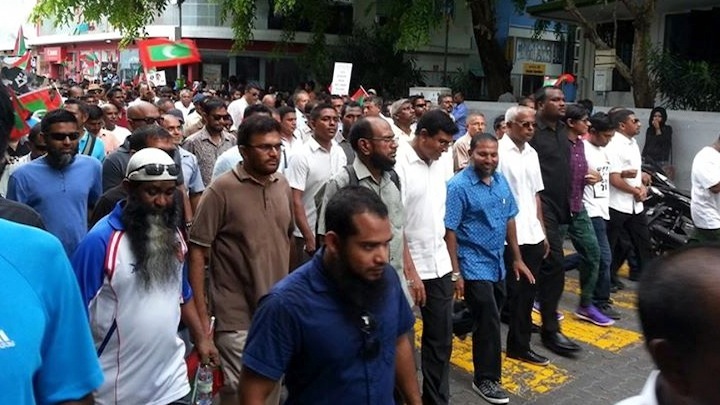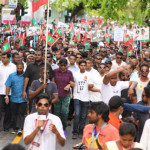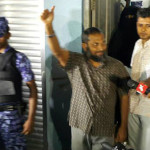The criminal court has released Adhaalath Party (AP) president Sheikh Imran Abdulla from police custody with a ban on traveling overseas for one-month.
Imran was arrested from the mass anti-government protest on May 1 and accused of encouraging violence.
The criminal court had extended Imran’s remand detention twice, but ordered his release today with the last 10-day period due to expire tonight.
Speaking to the press upon his release from police custody, Imran said the May Day protest was a success because it had “forced” President Abdulla Yameen to initiate talks with the opposition.
“It was really because of the people who went to jail with us that we have achieved one of our main demands. The government was forced to come to the discussion table with political parties because of the large number of people who were there for the May 1 protest,” Imran said.
If the government is sincere, the allied opposition parties are ready to engage in dialogue to resolve the political crisis, he said.
Imran denied allegations inciting violence during his speeches on May 1, which police contend led to protesters assaulting police officers, damaging property, and disrupting public order and safety.
“I have never encouraged anyone to create unrest, fear, harm anyone, at any time,” he said.
The police have forwarded cases against Imran, along with main opposition Maldivian Democratic Party chairperson Ali Waheed and Jumhooree Party deputy leader Ameen Ibrahim, for prosecution on charges of threatening and inciting violence.
Prior to Imran’s release, the president’s office reportedly rejected Imran as a representative of the AP for official talks with the government saying he was under police custody.
The president’s office’s spokesperson, Ibrahim Muaz, told Minivan News that the government will accept all representatives proposed by the allied opposition parties if there were no “legal, medical, physical, or administrative obstacles.”
Muaz declined to comment on whether the government would accept Imran as a representative for the talks following his release.
Remand appeal
Hours before Imran’s release, the high court overturned the criminal court’s May 17 ruling to keep Imran in police custody for 10 days.
The appellate court transferred Imran to house-arrest.
In a ruling this afternoon, judges noted that Imran has diabetes and that tests conducted following his arrest showed high levels of blood pressure, cholesterol, and urine acidity.
A doctor had also recommended that Imran should not sleep on hard surfaces due to a spinal injury.
Imran’s lawyer, Ali Zahir, told local media that criminal court judge Ali Sameer had considered the high court ruling before releasing the AP leader.
The police had submitted a letter from the prosecutor general’s office to the court stating that Imran should be held in pre-trial detention, Zahir said.
Zahir said the PG office’s letter stated that the investigation had identified reasons for prosecution.
The police had already concluded its investigation and forwarded charges to the PG office.
Opposition alliance
After forming an alliance in March with the main opposition Maldivian Democratic Party, senior members of the Jumhooree Party, and members of imprisoned ex-defence minister Mohamed Nazim’s family, Imran had been at the forefront of ‘Maldivians against tyranny’ campaign.
The May Day rally – the largest protest in over a decade – was the second mass protest staged by the opposition calling for the release of former President Nasheed and Nazim.
Nearly 200 people were arrested from the May Day demonstration following a police crackdown after protesters attempted to enter the restricted Republic Square at dusk.
Two weeks after the historic protest, President Abdulla Yameen extended official invitations for separate talks with the allied opposition parties.
While the JP promptly accepted the invitation, the AP proposed Imran among its representatives and the MDP proposed imprisoned ex-President Nasheed.
The government has also rejected Nasheed as the MDP’s representative for the talks as the opposition leader is serving a 13-year jail term and ruled out negotiations for the release of Nasheed and Nazim.
The opposition alliance has meanwhile called for a third mass protest on June 12.





